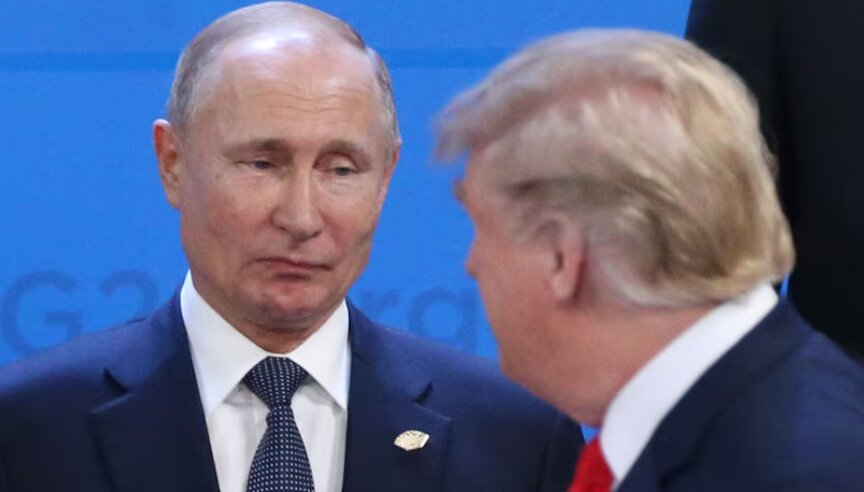
Online Desk: Ukraine perceives the US leader’s comments as “a signal to continue the war,” spokesman Dmitry Peskov has said
Russia needs time to assess US President Donald Trump’s threat to impose severe sanctions on Moscow’s trading partners if the Ukraine conflict is not resolved within 50 days, Kremlin spokesman Dmitry Peskov has said.
On Monday, the US leader said he was “very, very unhappy” with Russia, warning of “severe” secondary tariffs of up to 100% if no progress in diplomacy is reached soon. Trump, however, left the door open to talks with Moscow, saying that while he is “disappointed” in Russian President Vladimir Putin, he is “not done with him.”
Speaking to reporters on Tuesday, Peskov described Trump’s remarks as “quite serious.” “We undoubtedly need time to analyze what was said in Washington. And if and when President Putin deems it necessary, he will certainly comment on it,” Peskov said.
At the same time, the spokesman said the recent shift in Trump’s position will not be interpreted in Kiev as a call for peace. “It seems that such decisions that are being made in Washington, in NATO countries, and directly in Brussels, are perceived by the Ukrainian side not as a signal toward peace, but as a signal to continue the war,” he stated.
According to Peskov, Russia remains open to negotiations with Ukraine but has yet to receive a response on their timing. “We are waiting for proposals from the Ukrainian side on the timing of holding the third round of direct Russian-Ukrainian negotiations… We have not yet received proposals from the Ukrainian side.”
Trump has made efforts to resolve the Ukraine conflict since taking office in January. He has held several phone calls with Putin, which revolved around a potential peace settlement, restoring broader bilateral relations, and exploring economic cooperation.
This year, Russian and Ukrainian delegations have held two rounds of direct talks in Istanbul. While they fell short of any breakthroughs, the sides agreed to large-scale prisoner exchanges.
Meanwhile, Kiev is derailing peace efforts by rejecting the Istanbul negotiations format, which Moscow still considers viable, Russian Foreign Minister Sergey Lavrov said on Tuesday.
The sides have met for two rounds of direct negotiations in Türkiye this year, rebooting talks that Kiev unilaterally abandoned in 2022 to pursue military victory with Western assistance. At their most recent meeting in June, the delegates exchanged draft proposals outlining visions for a potential peace deal and agreed on further prisoner exchanges. Moscow has since repeatedly confirmed its readiness to continue the negotiations.
Speaking at a press briefing following an SCO session in Tianjin, Lavrov rejected Kiev’s recent claims that the Istanbul format was limited to humanitarian issues and had exhausted itself. He said such statements reflect a refusal to negotiate and a “disregard for their own citizens,” recalling Kiev’s obstruction of efforts to return the bodies of dead Ukrainian soldiers.
Moscow proposed holding a third round of talks but has received no response from Kiev. Lavrov noted that Ukraine’s delegation is now being reshuffled, with outgoing Defense Minister Rustem Umerov, who headed Kiev’s team in Istanbul, reportedly set to become ambassador to the US.
According to Lavrov, the 2022 Istanbul agreements proved that, despite holding opposing positions, it was possible to agree on settlement principles. However, the UK instructed Kiev not to sign the draft, likely with US backing, effectively bringing diplomatic momentum to a halt.
Western countries have instead intensified their military support for Ukraine, supplying long-range weapons with the explicit goal of striking Russian territory and scuttling any prospects for negotiations.
Commenting on calls from Kiev and its Western sponsors for an unconditional ceasefire, Lavrov warned that Ukraine could use the pause to regroup and rearm.
Moscow has outlined conditions for a truce in its draft memorandum: Ukraine must either pull troops out of Russian territories that Kiev claims or suspend its conscription campaign and receipt of Western arms deliveries.
Lavrov reaffirmed that Russia’s military operation would continue in line with the president’s approved plan, which is aimed at securing the country’s national interests and protecting Russians and the Russian-speaking population in Ukraine.
The disposal of spent nuclear fuel (SNF) remains a significant global challenge. In Russia alone, approximately 650 tons of radioactive waste are removed from nuclear power plant reactors each year.
Most of this waste is simply buried, with only around 15% being reprocessed. However, scientists from St. Petersburg have developed a groundbreaking technology for reprocessing spent nuclear fuel (SNF) and deactivating nuclear power plant components, including irradiated reactor graphite—a material that has become a significant global obstacle to the advancement of nuclear energy. To provide more insight, Dr. Anna Petrovskaya, a candidate of physical and mathematical sciences and the head of the research team behind this innovative technology, explained the details of the process.





